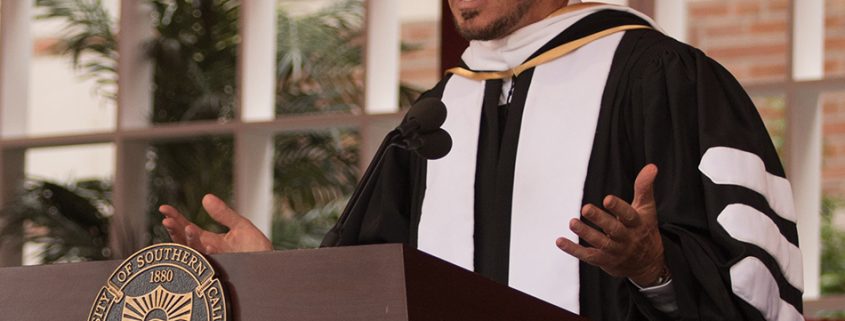Larry Ellison funds new USC cancer research and treatment center
The Ellison Institute for Transformative Medicine is an innovative collaboration that will bring together both interdisciplinary research and holistic practices with the goal of studying cancer, while treating and preventing it. The institute was made possible through a gift from 2016 USC Commencement Speaker and Oracle Foundation founder Larry Ellison. The institute already has a team in place with David B. Agus, a medicine and engineering professor at USC, taking the lead.
Chief Operating Officer Lisa Flashner explained that the institute will be unique because of its interdisciplinary approach. Flashner described an open environment which will foster a creative community where everyone is involved in the medical process, including the patients.
“It’s not only about biological sciences but also a convergence and unity of all sciences,” Flashner said. “Everything from sort of the typical areas like technology, mathematics and engineering, but also art and food and really being an open environment to bring these disciplines together.”
Agus, who is also the director of USC’s Norris Westside Cancer Center and the Center of Applied Molecular Medicine at the Keck School of Medicine of USC, believes in using communication to advance medicine.
“We need new ways of approaching [cancer] and thinking about it.” Agus said.
Agus described his think tank, where experts from a range of fields will contribute toward cancer research, as one of the facets of the institute he is most excited about.
“The greatest thinkers in [fields such as] math and physics are going to come and we are going to present problems that we have in cancer. We are going to talk about different ways to approach it,” Agus said. “Every discipline thinks differently and when you put them all together that seems to do something magical.”
Agus described his method as “vertical integration,” or when one organization handles research stages that would usually require several different entities to complete. He believes that this interdisciplinary model may change research methods across the medical spectrum, and his approach will apply to other diseases.
“I hope that these ‘verticals’ can be created for cancer all over the country and then for heart disease, for rheumatoid arthritis and for all diseases. I think it’s a new way of making researchers, thinkers, patients and doctors work together,” Agus said.
In line with Agus’ philosophy, the institute will focus on both cancer treatment and prevention, with efforts and programs designed for whole-body wellness. Combined with an artistically designed space and proper food and nutrition, the institute will aim to create a welcoming environment to foster healing and discovery. The buildings will have pathways where students and patients can look in to watch the research efforts. USC also announced that the institute will house spaces such as gardens, a library and a wellness clinic.
The Ellison Institute will also offer chances for students and the community to engage in educational opportunities. Students will be able to pursue work at the institute, and even the patients will be immersed in the research.
“For me it’s all about experience,” Agus said. “You need to be able to see it, smell it and touch it in order to hopefully understand it and make a difference.”
The institute, Agus said, is making progress toward treating cancer, but its mission is greater than that singular goal.
“My job is not just to treat cancer,” Agus said. “It’s to change how we treat cancer.”

